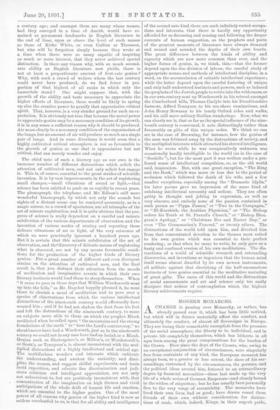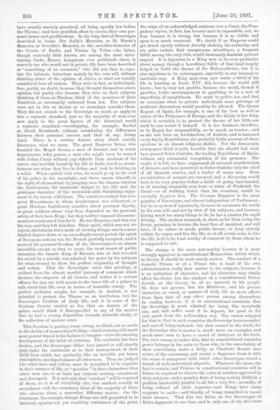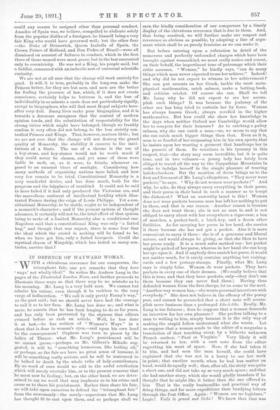MODERN MONARCHS.
ACHANGE is passing over Monarchy, or rather, has already passed over it, which has been little noticed, 'but which will in future materially affect the comfort, and ultimately the conduct, of almost all Sovereigns in Europe. They are losing their remarkable exemptioli from the pressure of the social atmosphere, the liberty to be individual, and in private life completely themselves, which has hitherto in all ages been among the great compensations for the burden of the Crown. Ever since the days of the Cossars, who, owing to an exceptional conjunction of circumstances, were singularly free from restraints of any kind, the European monarch has always been, to a greater or less extent, the slave of his sur- roundings, restrained by the circumstances, the persons, and the political ideas around him, fettered to an extraordinary degree by financial necessities—these last made up the very life of a whole series of German Emperors—and closely bound. in the withes of etiquettes ; but he has usually been personally free to the very verge of eccentricity. The monarchs have lived their own lives, bad or good ; have drawn round them friends of their own without consideration for distinc- tions of rank, which, indeed, Kings, in their superb pride, have usually scarcely perceived, all being equally low before the Throne ; and have gratified, often to excess, their own per- sonal tastes and predilections. In the long lists of Sovereigns described in books like Sully's Memoirs, or St. Simon's Memoirs, or Greville's Memoirs, or the anecdote-histories of the Courts of Berlin and Vienna by Vehse—the latter, though curiously little known, are among the most enter- taining books Messrs. Longmans ever published—there is scarcely one who would not in private life have been described as "something of an eccentric," who did not, that is, regu- late his intimate behaviour mainly by his own will, without thinking either of the opinion of others, or what are usually considered laws of custom. They were in fact, as individuals, free, partly, no doubt, because they thought themselves above opinion, but partly also because they were so, their subjects thinking of them as Hindoos think of the members of their Pantheon, as necessarily unbound from law. The subjects were not in this so slavish as we nowadays consider them. They did not crouch to the Sovereign so much as apply to him a separate standard, just as the majority of men even now apply to the great figures of the theatrical world. a separate standard,—worshipping, for example, Rachel or Sarah Bernhardt, without considering the differences between their personal careers and that of, say, Jenny Lind. There is a curious Asiatic story which exactly illustrates what we mean. The great Emperor Baber, who founded the Mogul throne, a man of distinct and in many departments lofty genius, a man who might even be named with Julius Comer without any ridicule from students of his career, was horribly bored by his life in India, bored as moun- taineers are when they live in deltas, and took to drinking as a relief. When excited with wine, he would go up to the roof of his palace in the moonlight, and there amuse himself, in the sight of all mankind, by jumping over the chasms between the battlements, the imminent danger to his life and the grotesque character of the recreation alike furnishing enjoy- ment to his heroic wilfulness. The courtiers around him were great Mussulmans to whom drunkenness was abhorrent, or great Hindoos fastidiously sensitive about personal dignity, or great soldiers whose very lives depended on the personal safety of their hero-King ; but they neither opposed his amuse- ment nor condemned him for it. He was Emperor, and that was his way, and they left him free. Their spirit, which was not, we repeat, slavishness, but a mode of viewing things, was in a more limited degree, down to an exceedingly recent period, the spirit of European nations too, the French partially excepted ; and it secured the personal freedom of the Sovereigns to an almost incredible extent, so that, to quote the most recent of public examples, the lunatic King of Bavaria, who at last revealed his secret by a suicide, was admired for years by his subjects for what seemed to them his perfect originality of thought and action. That the Sovereigns value this privilege, is evident from the almost morbid jealousy of comment which dictates the etiquette of all Courts, and makes it a serious offence for any one with access to the inner life of a palace to talk about that life, even in terms of honorific eulogy. The perfect seclusion sought, for example, in Austria, is not intended to protect the Throne as an institution, but the Sovereign's freedom of daily life, and is in some of the German Courts carried so far, that an inmate of the palace would think it disrespectful to say of his master that he had a strong disposition towards scientific study, or the collection of ancient coins.
This freedom is passing away, owing, we think, not so much to the decline of monarchical feeling—which remains still much more potent than it is the fashion to imagine—as to the amazing development of the habit of criticism. The seclusion has been broken, and the Sovereigns either have passed or will shortly pass under the constraint as to their management of their daily lives which has gradua]ly, like an invisible yet heavy atmosphere, enveloped almost all other men. They are judged like other men, and will no more be permitted to be separate in their manner of life, or " peculiar " in their characters, than other men are, or at least not without exciting resentment and disrespect. It is not only that " conduct " will be required of them, as it is of everybody else, but conduct exactly in accordance with the customary ideas of the majority of those who observe them, a somewhat different matter. On the Continent, for example, though Kings are still permitted to be immoral, opinion not yet requiring continence of the great, the reign of an acknowledged mistress over a Court, the Pom- padour regime, in fact, has become next to impossible, not, we fear, because it is wrong, but because it is so visible and open to so much comment. We doubt if an Emperor could get drunk openly without directly shaking his authority, and are quite certain that conspicuous miserliness, a frequent foible among the very rich, would immensely diminish general respect. It is injurious to a King now to be even particular about money, though a hereditary foible of that kind largely helped to build the throne of the Hohenzollerns ; but it is also injurious to be extravagant, especially in any unusual or inartistic way. A. King may even now waste a third of his life in hunting, as Louis XIV. did, because the world still hunts ; but he may not gamble, because the world, though it gambles, holds encouragement to gambling to be a sort of superfluity of naughtiness. He must be polite, too, and that on occasions when to private individuals some privilege of moderate discourtesy would possibly be allowed. The Queen Regent of Spain, for example, is one of the best as well as ablest of the Princesses of Europe, and she thinks it her duty, which it certainly is, to protect the throne of her little son until he can mount it himself. It is her business, therefore, to be Royal, her responsibility, so to speak, as trustee ; and as she was born an Archduchess of Austria, and is harassed every day by Republicans, she probably holds persons of those opinions in an almost religious dislike. Yet the democratic newspapers think it quite horrible that she should ]at week have passed Senor Castelar, the leading Republican of Spain, without any ceremonial recognition of his presence. She ought, it is felt, to have suppressed all external manifestation of distaste, and have perceived in Senor Oastelar only the chief of all Spanish orators, and a leader of many men. Even eccentricities of manner are resented, and a Sovereign would have to be very popular before a habit of going bare-headed, or of wearing unusually easy hats—a whim of Frederick the Great—or of walking faster than his courtiers, would be cordially forgiven him. The German Emperor is the most popular of Sovereigns, and almost independent of Parliament; but he is spoken of injuriously, because he measures his words by his own will, and not by that of his subjects, and because, having much too many things to do, he has a passion for rapid driving. The modern monarch, in short, so far from being the freest, promises to become the least free of mankind, and will have, if he values or needs public favour, to keep • strictly within the ropes, and live the life, or at all events seem to live the life, held to be least worthy of comment by those whom he is supposed to rule.
The change is the more noteworthy because it is most strongly apparent in constitutional Monarchies, within which, in theory, it should be most nearly useless. The conduct of a despotic Prince, or of a Prince who is head of his own administration, really does matter to his subjects, because it is an indication of character, and his character may vitally affect the State; but the conduct of a constitutional Prince should, on the theory, be of no moment to his people. He does not govern, but his Ministers ; and his private character, or creed, or manner of daily life no more affects them than that of any other person among themselves. In reality, however, it is in constitutional countries that the Sovereign is most admired for being like everybody else, and will suffer most if he departs, for good or for evil, much from the well-trodden way. The reason assigned for this is, that in such countries the Sovereign is an exemplar, and sure of being imitated; but that cannot be the truth, for the Sovereign who is master is much more an examplar, and much more sure to have a crowd of imitators at his heels. The true reason is rather this, that in constitutional countries power belongs in the main to those who, in the uncertainty of their convictions, make a deity, as Charlotte Brontë once wrote, of the customary, and resent a departure from it with the sense of annoyance with which other Sovereigns resent a breach of well-understood etiquette. Whatever the cause, the fact is certain, and Princes in constitutional countries will in future be required to observe the rules of conduct approved by their subjects, under penalty, first, of being acutely disliked, a position intolerably painful to all but a very few; secondly, of being refused all their requests—and Kings have many requests to make—and thirdly, of being compelled to vacate their thrones. That fate has fallen on five Sovereigns or Heirs-Apparent in our time, and in only one of the five cases could any reason be assigned other than personal conduct. Amadeo of Spain was, we believe, compelled to abdicate solely _from the popular dislike of a foreigner, he himself being a very fair King who would have governed well; but the other four —the Duke of Brunswick, Queen Isabella of Spain, the Crown Prince of Holland, and Don Pedro of Brazil—were all dismissed on account of failures in conduct, which in the first three of those named were most grave, but in the last amounted only to eccentricity. He was not a King, his people said, but a faddist, consumed with an imbecile sort of universal scientific curiosity.
We arc not at all sure that the change will work entirely for good. It will, it io true, probably in the long-run make the Princes better, for they are but men, and men are the better for feeling the pressure of law, which, if it does not create c onscience, certainly helps to buttress it, and the loss of individuality in so minute a caste does not particularly signify, except to biographers, who will find most Royal subjects here- after very dull. Smug lives make poor biographies, and it is towards a decorous smugness that the control of modern opinion tends, and the substitution of respectability for the .strong virtue which might have belonged, though we frankly confess it very often did not belong, to the less strictly con- trolled Princes and Kings. That, howevei., matters little ; but we are not sure that the change will not destroy the grand quality of Monarchy, the stability it ensures to the insti- tutions of a State. The use of a throne is the use of a key-stone, and key-stones would not be worth much if they could never be chosen, and yet some of them were liable to melt, or, as it were, to frizzle, whenever ex- posed to an unusual blaze of sunlight. Considering how many methods of organising nations have failed, and how very few remain to be tried, Constitutional Monarchy is a very wonderful device, and has done much, both for the progress and the hdppiness of mankind. It could not be said to have failed if it had only produced the Victorian era, and the marvellous outburst of intellectual fertility which illus- trated France during the reign of Louis Philippe. Yet a con- stitutional Monarchy, to be stable, ought to be independent of a monarch's character ; and if the present system of thought advances, it certainly will not be, the total effect of that system being to make of a limited Monarchy also a conditional one. Napoleon said that a constitutional King was only "a fatted hog," and though that was unjust, there is some fear that the ideal which the crowd is seeking will be found to be, when we have got him, only a fatted bourgeois. Could the mystical charm of Kingship, which has lasted so many cen- turies, survive that?




































 Previous page
Previous page